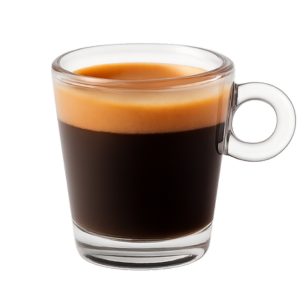
Cuban Coffee
Caffeine
40–70 mg
Note: Caffeine amounts are based on a typical Cuban espresso shot (cafecito) brewed in a moka pot or espresso machine. Actual values vary depending on bean type, roast level, grind size, and sugar added during preparation.
| Attribute | Value |
|---|---|
| Caffeine Level | High |
| Serving Size | 1–2 fl oz |
| Serving Size (ml) | 30–60 ml |
| Caffeine | 40–70 mg |
| Calories | 25–35 kcal |
| Sugar | 5–7 g |
| Caffeine per fl oz | 35–40 mg/fl oz |
Cuban coffee, or cafecito, is famous for its bold flavor and concentrated strength. Despite being served in small cups, it delivers a caffeine punch that rivals or exceeds many larger coffee drinks.
What Is Cuban Coffee?
Cuban coffee is a traditional espresso‑style drink brewed using a stovetop moka pot or espresso machine. It’s typically sweetened during brewing, creating a signature foam called espuma.
Key features that define Cuban coffee:
- Brewing Method – Traditionally made in a moka pot (cafetera), producing concentrated coffee.
- Serving Size – Usually 1–2 oz shots, far smaller than a standard 8 oz drip coffee.
- Sweet Foam (Espuma) – Sugar whipped with the first drops of coffee, giving a caramelized froth.
- Cultural Ritual – Often shared socially, especially in the form of a colada.
- Strength – High caffeine concentration per ounce compared to drip coffee.
Together, these traits make Cuban coffee both a beverage and a cultural experience — small in size but powerful in impact.
Flavor Profile and Roast Level
Cuban coffee is known for its intense taste, shaped by bean choice and roast.
Typical characteristics include:
- Dark Roast Beans – Usually Arabica, sometimes blended with Robusta for extra strength.
- Smoky & Bold Flavor – Dark roasting enhances bitterness and body.
- Sweet Balance – Sugar added during brewing softens the sharp edges.
- Thick Mouthfeel – Concentrated extraction creates a syrupy texture.
- Lingering Finish – Strong aftertaste compared to lighter roasts.
This combination explains why Cuban coffee feels stronger than many other espresso‑based drinks, even when caffeine levels are similar.
Caffeine in a Standard Cuban Espresso Shot (Cafecito)
The cafecito is the foundation of Cuban coffee culture — a small but potent shot.
Caffeine content per serving:
- Serving Size – 1–2 oz (30–60 ml).
- Caffeine Range – ~40–70 mg per shot.
- Per Ounce Strength – Roughly 2–3 times stronger than drip coffee.
- Comparison – Similar to a standard espresso shot (~63 mg).
- Effect – Quick, sharp boost in alertness.
Although small, a cafecito delivers concentrated caffeine, making it feel stronger than its numbers suggest.
Cortadito: How Much Caffeine in This Sweetened Espresso Mix
The cortadito is essentially a cafecito “cut” with steamed milk, creating a balanced drink.
Caffeine profile:
- Serving Size – ~4 oz (120 ml).
- Caffeine Range – ~40–80 mg.
- Milk Ratio – 1:1 coffee to milk, diluting intensity but not reducing total caffeine.
- Flavor – Creamier, sweeter, less bitter.
- Comparison – Similar caffeine to a small latte, but in a smaller serving.
The cortadito is ideal for those who want the Cuban coffee experience with a smoother, less intense edge.
Café con Leche: Caffeine Content in a Larger Serving
Café con leche is the most “breakfast‑friendly” Cuban coffee, pairing strong espresso with hot milk.
Caffeine breakdown:
- Serving Size – 6–8 oz (180–240 ml).
- Caffeine Range – ~60–120 mg.
- Composition – 1–2 shots of Cuban espresso plus steamed milk.
- Flavor – Milder, creamy, closer to a latte.
- Comparison – Similar caffeine to a standard 8 oz drip coffee (~95 mg).
This makes café con leche a more approachable option for daily drinking compared to the intense cafecito.
Factors That Affect Caffeine Levels (Beans, Roast, Brew)
Not all Cuban coffees contain the same amount of caffeine. Several factors influence the final numbers:
- Bean Type – Arabica (lower caffeine, smoother) vs. Robusta (higher caffeine, stronger).
- Roast Level – Dark roasts taste stronger but may have slightly less caffeine by weight.
- Grind Size – Finer grinds extract more caffeine.
- Brewing Method – Moka pot and espresso machines extract more caffeine than drip.
- Serving Size – A colada (6 oz shared coffee) can contain 250–350 mg total caffeine.
These variables explain why caffeine estimates for Cuban coffee range widely, from ~40 mg in a small cortadito to over 300 mg in a full colada.
